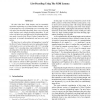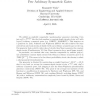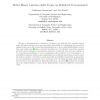16 search results - page 3 / 4 » On Derandomizing Probabilistic Sublinear-Time Algorithms |
APPROX
2004
Springer
13 years 11 months ago
2004
Springer
A quantum encryption scheme (also called private quantum channel, or state randomization protocol) is a one-time pad for quantum messages. If two parties share a classical random s...
COCO
2001
Springer
13 years 10 months ago
2001
Springer
Restricting the search space {0, 1}n to the set of truth tables of “easy” Boolean functions on log n variables, as well as using some known hardness-randomness tradeoffs, we ...
FOCS
2003
IEEE
13 years 10 months ago
2003
IEEE
We show that Yao’s XOR Lemma, and its essentially equivalent rephrasing as a Direct Product Lemma, can be re-interpreted as a way of obtaining error-correcting codes with good l...
COCO
2005
Springer
13 years 7 months ago
2005
Springer
We exhibit an explicitly computable ‘pseudorandom’ generator stretching l bits into m(l) = lΩ(log l) bits that look random to constant-depth circuits of size m(l) with log m...
APPROX
2007
Springer
13 years 11 months ago
2007
Springer
We give a polynomial time construction of binary codes with the best currently known trade-off between rate and error-correction radius. Specifically, we obtain linear codes ove...



